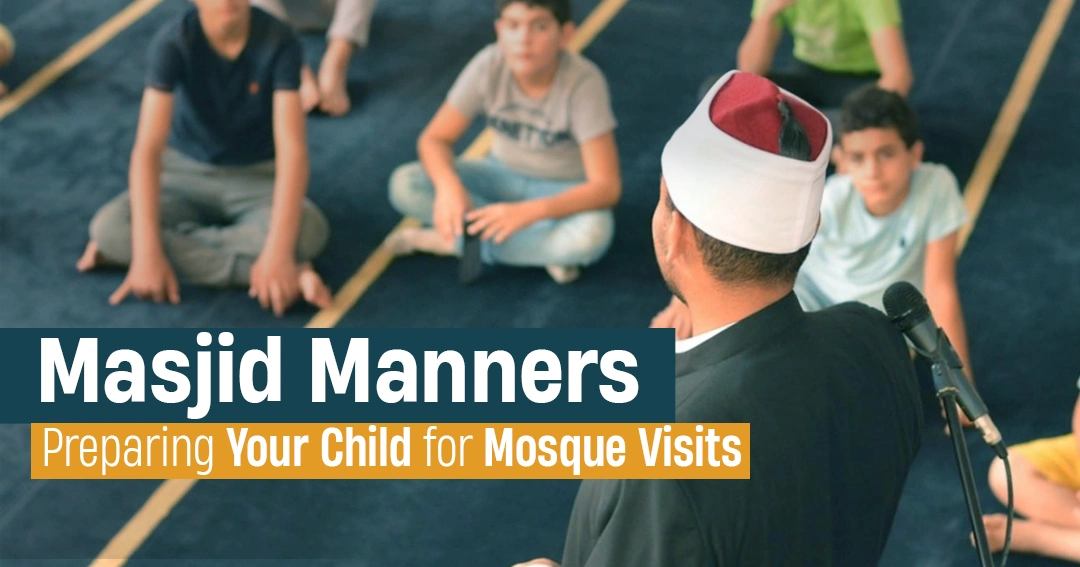Masjid etiquette for Muslim children is maybe the most valuable lesson parents and educators can teach. Teaching children to be polite at the mosque not only reinforces their relationship with prayer but also creates lifetime routines according to Islam.
Whether it’s their first trip or they go on a regular basis, this article will prepare your child for a worthwhile and enriching masjid experience.
When to Start Teaching Masjid Manners
Every child is different, but at the age of 4 or 5, children are taught to obey simple instructions and social norms. This is the best age to instill simple Masjid etiquette for Muslim children, like removing shoes, whispering instead of talking loudly, and staying still for short segments of the prayer.
Children get more comfortable and reliable in the masjid by gradually increasing the time and participation.
Essential Masjid Etiquette for Muslim Children
Masjid etiquette for Muslim children is not just about rules, it’s about instilling respect for the holiness of the mosque and encouraging children to be observant, respectful, and tranquil in a shared place of worship.

Below are some basic Islamic manners for kids that each child should know before going to the masjid.
Dress Modestly and Tidily
The first Masjid etiquette for Muslim children is dressing modestly. Modesty and neatness show respect for the sacred space.
Girls should wear a loose garment and headscarf (once old enough), and boys should wear long trousers and a simple shirt. Parents must teach them that how we dress shows how much we respect Allah’s house.
Perform Wudu Before Entering the Masjid
Another elementary aspect of Masjid etiquette for Muslim children is coming to the masjid tidy. Encourage children to take wudu (ablution) at home or, preferably, in the mosque’s prescribed area.
Not just will it ready them for prayer, but it will ready them for knowing the religious and bodily purity demanded in the masjid.
Enter Respectfully and Recite the Masjid Du’a
Make your child memorize the du’a to enter the mosque and teach them to enter with their right foot. This small but meaningful habit creates spiritual awareness and is an important part of Masjid etiquette for Muslim children. It also makes the experience more intentional and special.
Be Quiet and Still During Prayer or Khutbah
Remaining silent during salah and khutbah is one of the Masjid etiquette for Muslim children. It may be challenging for young ones, but setting limits before visiting, and keeping yourself calm, will help them learn. If they become agitated, firmly restore them on course without scolding, patience is a learning process.
Don’t Run, Play, or Yell Inside
Masjid is not a playground, and kids should understand that running around, playing, or screaming in the masjid disturbs other people. Walking quietly, sitting calmly, and not encroaching upon other worshipers’ personal space and attention is one of the most frequently stated lessons in Masjid etiquette for Muslim children.
Place Shoes in the Right Area
Make your child remove their shoes and place them in the designated location. This is an act of discipline and a very vital aspect of Masjid etiquette for Muslim children. You can even practice this habit at home as part of daily routine to instill consistency.
Leave the Masjid as You Found It
Respecting the masjid also means keeping it clean. Children should be taught not to go into prayer areas with snacks, garbage, or noisy toys.
Making a conscious effort to leave the masjid in good order and clean is a simple way to show respect for this place of worship and grasp the broader Islamic value of cleanliness, a central part of Masjid etiquette for Muslim children.
How Parents Can Prepare Children Before a Visit?

Preparing the child in advance while going to the mosque makes a big impact on what they do and feel within. Establishing expectations from the start ensures your child not only has fun during the visit but also knows and observes the right Masjid etiquette for Muslim children.
Practice at Home: Create a Mini-Masjid Environment
Practice Masjid etiquette for Muslim children at home before heading to the masjid. Create a quiet praying environment in which your child can learn to sit down quietly, read short surahs, and listen attentively.
Imaginative play routines like shoe-removal, wudu, or entering with the right foot are also great practices to do in a calm, stress-free setting.
Discuss What to Expect at the Masjid
It is one of the best manners to instruct Muslim children on masjid etiquette by informing them about what will occur in the visit.
Discuss why the masjid is a special place, what others do there, and what is expected of your child. Be descriptive and speak in a manner they understand, in a positive way. This eliminates fear or doubt and generates excitement.
Set Behavior Goals and Use Gentle Reminders
Right before entering the masjid, review key behaviors with your child: “We’re going to walk quietly, listen carefully, and not disturb others.” Repetition is key when teaching Masjid etiquette for Muslim children, so offering friendly reminders in a calm tone helps reinforce good habits without pressure or punishment.
Choose the Right Time for the First Visits
If they’ve never been to the masjid, try to visit during an off-peak time, such as mid-morning or in between prayers. This allows you the flexibility to gradually introduce your child to the experience of the masjid without interruptions or tension.
Gradually adding time and frequency helps build confidence in being able to teach Masjid etiquette for Muslim children.
Engage Children in Simple Acts of Worship
Have your child carry a small prayer mat, feed a coin to the sadaqah box, or help open a door for another individual.
These minor acts make kids emotionally bonded to the masjid and bring home the fact that they belong. Involving them in such endeavors reinforces their sense of Masjid etiquette for Muslim children and induces love for worship.
Short duas for children to memorize for masjid visits

Learning brief, age-specific du’as is a simple yet powerful way to foster mindfulness and respect with your child in mosque visits. These du’as not only foster religious awareness, but also highlight important aspects of Masjid etiquette for Muslim children. Master one or two, and gradually develop a practice your child will love and commit to memory.
1. Dua for Entering the Masjid
Encourage your child to say this du’a softly when stepping into the mosque:
اللَّهُمَّ افْتَحْ لِي أَبْوَابَ رَحْمَتِكَ
“Allahumma iftah li abwāba raḥmatika.”
Meaning: O Allah, open the doors of Your mercy for me.
This beautiful du’a reminds children that the masjid is a place of Allah’s mercy. It’s a gentle first step in learning Masjid etiquette for Muslim children, helping them enter with reverence and awareness.
2. Du’a for Leaving the Masjid
When exiting, children can say:
اللَّهُمَّ إِنِّي أَسْأَلُكَ مِنْ فَضْلِكَ
“Allahumma inni as’aluka min faḍlika.”
Meaning: O Allah, I ask You for Your bounty.
This simple phrase helps children understand that worship continues even after leaving the masjid. It’s a natural part of teaching Masjid etiquette for Muslim children, showing that leaving respectfully is just as important as entering.
3. Du’a Before Wudu (Optional but Beneficial)
If your child is old enough to perform wudu before entering the mosque, teach them this easy du’a:
بِسْمِ اللَّهِ
“Bismillah.”
Meaning: In the name of Allah.
Though brief, this du’a builds the habit of beginning acts of worship with Allah’s name, an essential part of Islamic manners and a strong foundation for learning Masjid etiquette for Muslim children.
4. Du’a for Good Behavior and Calmness
You can also encourage a heartfelt personal du’a like:
“O Allah, help me stay quiet and respectful in the masjid.”
This type of simple, child-friendly supplication teaches children that good behavior is part of worship—and reinforces the deeper values behind Masjid etiquette for Muslim children.
If you found this article useful don’t forget to share it with your friends and family.
Help Your Child Grow with Beautiful Islamic Manners
Looking for practical ways to raise well-mannered, confident Muslim children? Explore our enriching collection of articles designed to teach kids the essential Islamic values every young Muslim should know.
From learning Islamic manners for children and building strong Islamic character, to mastering Islamic hygiene rules and masjid etiquette, each article is crafted to make Islamic teachings simple, relatable, and engaging for kids.
Plus, don’t miss the timeless wisdom of the Prophet ﷺ in our guide on Prophet Muhammad stories about manners for kids, and help your child learn the rights of neighbors in Islam and the proper Islamic way of speaking with love and respect.
Start reading now and guide your child toward becoming a well-rounded Muslim with beautiful adab and character.





